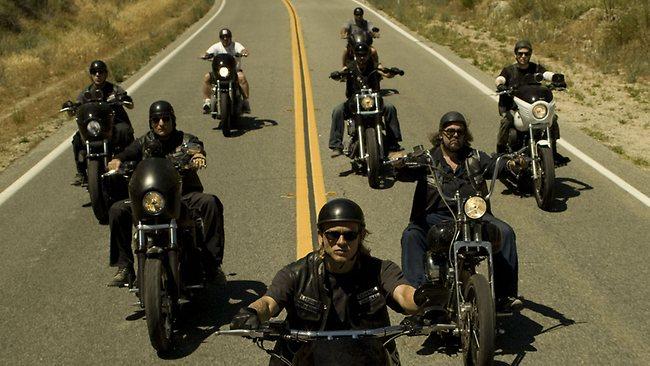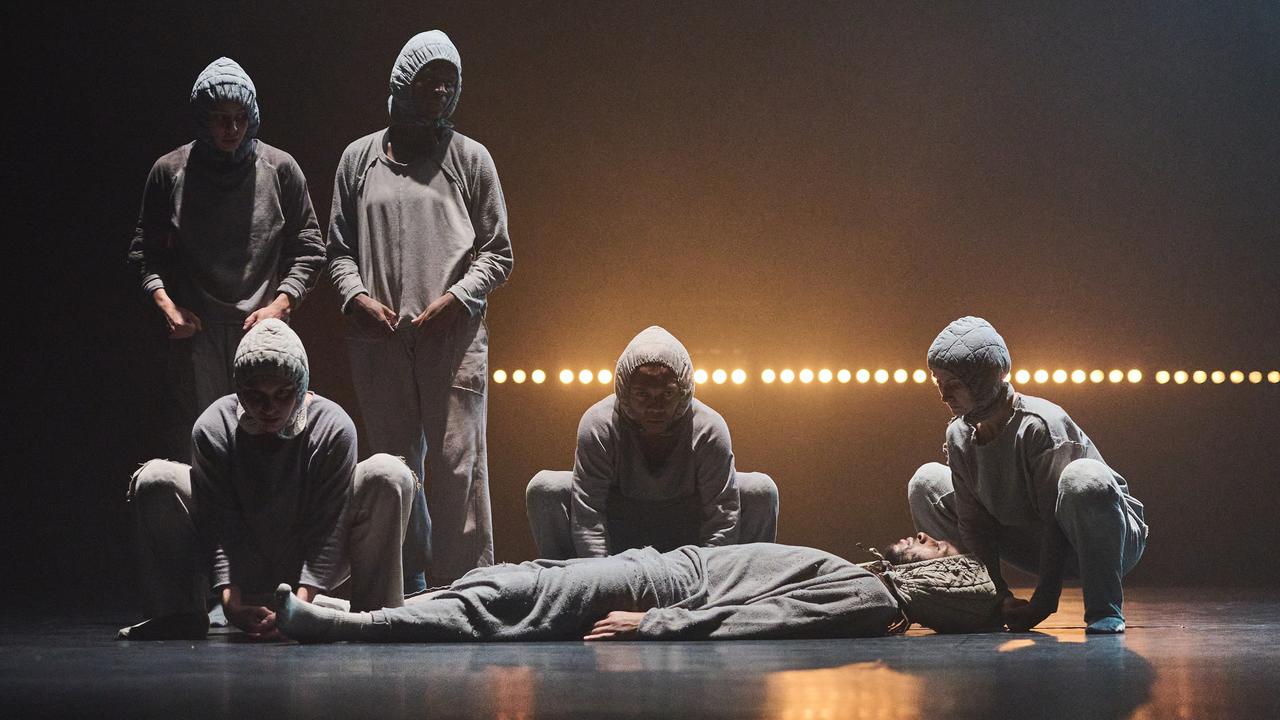On your bike
THIS cult series about the inner workings of a Hells Angels-type motorcycle club is wonderful, involving TV.

"LIFE should not be a journey to the grave with the intention of arriving safely in a pretty and well-preserved body, but rather to skid in broadside in a cloud of smoke, thoroughly used up, totally worn out, and loudly proclaiming, 'Wow! What a Ride!"'
This was Hunter S. Thompson talking -- and we know how it ended for him -- but it could be any of the characters in the remarkable, testosterone-driven Sons of Anarchy, which finally reached free-to-air television here last week.
I hadn't seen when it went to air but quickly watched the entire first series, mesmerised, so I know why its strident apologists have been shouting so loudly. This cult series from US cable network FX about the inner workings of a Hells Angels-type motorcycle club based in the fictitious town of Charming, somewhere in central California, is wonderful, involving TV.
I feel as if I've grown a grizzly beard and, now embroidered with tattoos, can handle an AR-18 with a 40-round magazine without trembling. I can't shake off the feeling I'm insolently wrestling a Harley-Davidson with SAMCRO -- Sons of Anarchy Motorcycle Club Redwood Original -- running guns through gangland northern California, beating back meth dealers, dumping bodies and crushing skulls.
The show is a buzz, a hoot and adrenalin-fuelled knock-out fun; it also happens to be highly intelligent, quite beautifully realised and so emotionally affecting at times you feel like weeping.
Created by Kurt Sutter, writer and executive producer on that fine hard-boiled cop show The Shield, SOA has something of the quality, intensity and ambition of other great US dramas such as The Sopranos, Homicide: Life on the Street, Oz, The Wire and Mad Men. If you believe the cultists, and I'm swinging their way as I write, it's one of those great, transformative shows that can still elucidate our anxieties and put our lives into modest perspective.
It's been cycling around pay TV on Showcase, the final explosive episode of season three airing there tomorrow night. The fourth season, in production in the US, is scheduled on the pay channel for early December.
Somehow Ten has picked up the early seasons and offers the chance for sequential viewing on its frantically re-branded digital channel One. The first two episodes, which aired back-to-back last week, set up the overarching plot and characters, and most of the detail is reprised this week, so if you missed it you'll soon catch up.
It's hard to deny the continuing intrigue it creates, clothing a criminal enterprise with the trappings of not only American folklore but Shakespearean mythology. I kid you not, brothers and sisters of the road: watch closely and you find allusions to play after play, especially to Hamlet; after all, the Bard knew a little about hard drinking, hard living and the thrill of violence.
Of course, Shakespeare's stories have been ransacked, re-created and straight-out plagiarised too many times to count, and references, story-lines or quotations turn up in almost every TV series made. But the way Sutter uses Shakespeare's tragic families, especially Hamlet, drawing from his archetypes to elevate the mundane realities of family relations inside this biker gang to emblematic levels, is brilliant and often heartbreaking TV.
The two best known lines from Hamlet may be aphorisms for Sutter's scripts: "To be or not to be: that is the question" and the advice, "to thine own self be true". But there are also resonances of Macbeth and King Lear, and a wonderful Shakespearean feeling of incestuous intrigue. The terrible weight of secrets pervades the entire series.
I know many of you probably avoided SOA like most of the new One offerings (Ice Road Truckers anyone?). So here is what you need to know to pick it up from this week.
The series chronicles the almost mythic adventures of Jackson "Jax" Teller (Charlie Hunnam), one of the gang's leaders, after he finds a manuscript written by his dead father, SAMCRO founder John Teller. Its pages reveal the group's sociable, almost hippie origins, and how the gang's progressive unlawfulness went against John's sense of ethics. Also in the first episode Jax discovers his own son's distressing premature birth by Wendy (Drea de Matteo), his crack-addicted former wife.
These two events, coupled with a rival gang's hijacking of the bikers' latest shipment of weapons and their violent retrieval by SAMCRO to Charming, has raised doubts in Jax's mind about his life and the future of his community.
As we saw in the pilot, the gang is now headed by hard man Clay Morrow (Ron Perlman), who took over when Teller died, and is using the Teller-Morrow auto shop as a front for running guns. Gemma Teller-Morrow (Katey Sagal) is wife to Clay and the widow of Teller, the fallen king. She may or may not have been involved in her first husband's death (the pilot leaves a large ambiguous question mark in the air) but has married his "brother" and is the mother of his increasingly reflective son. She is shaping him to duly take control of SAMCRO.
So Jax, the handsome biker prince, is the show's focus as his moral balance becomes progressively unhinged. He's a guy, Sutter says, who, "hears a lot of noise in his head", constantly struggling with the kind of man he thinks he should become, conflicted by his own genetics.
The ideas generating the series are always about family, about Jax defining his role as a father, a partner, a son and a member of the club. At its centre is a tale of family succession, about the way a well-liked son comes to understand his father's character and destiny, then allows himself to be shaped by that same destiny.
Along the way he has to find a way to balance the demands of the club, which he loves, with his own morality. In a way, it's a kind of complex mirror image of the American myth of success and social mobility. Like The Godfather, the series is also a complex variation on the vigilante myth. The biker gang takes the law into its hands to establish justice in the face of a corrupt, unjust social order; they use their skills in violence, honed in fighting America's wars, to achieve a level with people of established wealth and power. The series started out a little slowly last week and is still finding its way in the next several episodes but, as with so many of these long-form shows, lays the groundwork for several seasons to come. It takes a while to get to know these strange, violent, stoic people and their different social customs, cultural conventions and tribal rules.
The story-lines take us viscerally into the illegal businesses providing financial support for the club and its family members. Filmed in cinema verite style, it's as if we are voyeuristically viewing a sensationalist observational documentary.
Its swinging, panning subjective cameras, often mounted on the bikes, take us inside the Californian pornography industry, illegal gun sales, civic corruption and the special relationship between the murderous gangsters and law enforcement. And Sutter gives us world-class gunfights, punch-ups, escapes and invasions. But as the series hammers you with its gorgeously realised pulp theatrics, this wonderful morality play also moves you with the small moments of compassion, sacrifice and love.
Producer David Simon often says of his various highly regarded crime shows -- Homicide: Life on the Street, The Corner and The Wire -- that he had to teach people to watch TV in a different way, to immerse themselves in a way that the medium had long ago ceased to demand.
Sons of Anarchy is another show requiring immersion, certainly entertaining and amusing, but also nettling and unsettling and disturbing us. And even on One, hacked into parts for incessant, blowsy commercials, it will still provoke many of us to spare a thought or two about how we live and who we are. And why we're wearing leather jackets again.
A NEW feature-length series, Thorne, based on Mark Billingham's English crime novels, debuts this week on ABC1, part of British TV's attempt to create new iconic cops to fill the void left by the inevitable ratings decline, or disappearance, of shows such as Dalziel and Pascoe, Waking the Dead, Silent Witness, Wire in the Blood, Rebus and Taggart.
It's more than 20 years, too, since the British crime show showed any innovative flair with Prime Suspect and Cracker, bound by often pedestrian procedural formats when compared with American shows such as Cold Case, the CSI programs and the NCIS franchise, to say nothing of the genre-bending and experimentation of Dexter, The Shield or The Wire.
The BBC's Luther came and went last year, dying in Britain in the long dark night of the ratings, but it did stand out for a while at least. Created by crime novelist Neil Cross, the lead writer on series two of Spooks, there was a frantic energy in the show, lots of noirish moments and charismatic Idris Elba in the title role. Kenneth Branagh's Wallander series still has some life, as does the newer, slick contemporary Stephen Tompkinson DCI Banks, based on the successful Peter Robinson novels, but the BBC's engaging three-part Zen came and went earlier this year, again not renewed because of poor ratings.
Based on the Aurelio Zen detective novels of Michael Dibdin, the three-part series starred sweetly hoarse Rufus Sewell and the delectable Caterina Murino and, like DCI Banks, aired exclusively on pay's UKTV. The feature-length films, shot in Italy but spoken in English, were intelligent, sumptuously atmospheric and the restrained chemistry between the incorruptible Zen and love interest Murino was wittily and charmingly acted. So sexy.
I enjoyed it enormously, as I do Thorne: Sleepyhead, the first in the series from the Britain's Sky One channel, starring David Morrissey (State of Play, Red Riding) as the obsessive detective. He's 41 years old, three years divorced, childless, living alone in a flat in Kentish Town kitted out with furniture bought "one wretched Sunday at IKEA".
The first feature-length episode is beautifully and stylishly staged by director Stephen Hopkins and is an intelligent and faithful adaptation of Billingham's breakthrough novel. And it's just as relentlessly paced and ingeniously plotted. Billingham has a gift for writing about shocking things so that we need to keep reading to find some understanding of how they happen. Few writers deliver so many punches to the heart. If it hurts to read him sometimes, there's no way you want to stop.
And Sleepyhead sucks you in, too, as Thorne investigates a series of bizarre murders, an imaginative serial killer targeting women in their homes. After drugging them, he kinks an artery in their necks, causing strokes. Except the fourth victim, Alison Willetts, survives, hooked up to a ventilator in hospital, her senses functioning but unable to speak or move, a casualty of locked-in syndrome.
Alison Sara Lloyd Gregory as Willetts is a show-stealing stand-out, a performance full of a kind of inert power, a reflection of the emotionally coiled and constrained detective. And Morrissey, also executive producer, is a great Thorne, physically rugged and sadly convincing as the hard professional, an awkward bastard surrounded by shadows.
Thorne may not be a breakthrough series but it's clever and entertaining and the production has the kind of moral complexity, sociological density and cinematic dimension of the most creative US TV drama. And that can't be a bad thing.
Sons of Anarchy, Wednesday, 9.30pm, One.
Thorne: Sleepyhead, Friday, 8.30pm, ABC1.


